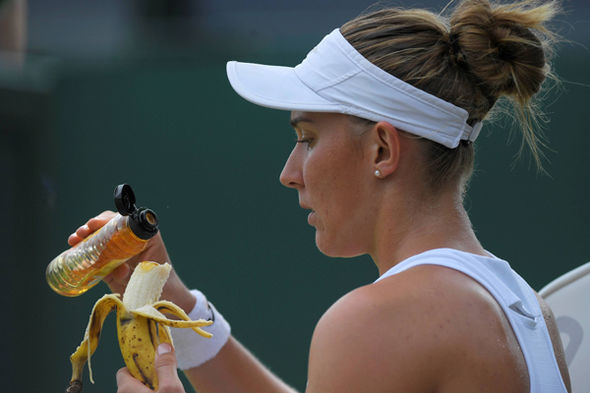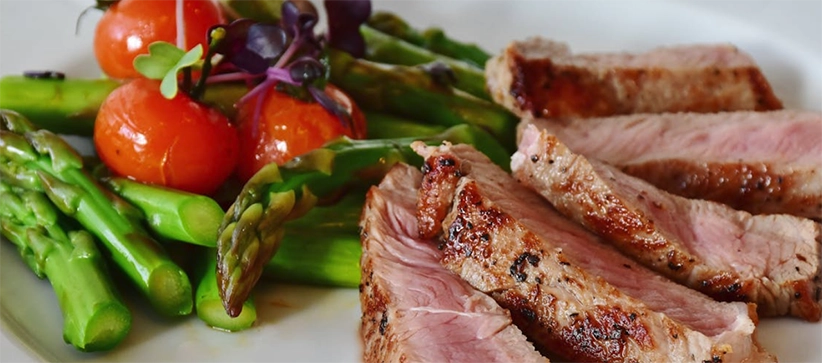If you want to play better tennis and get fit, there is another key element to achieving your goals – nutrition. There is a famous saying “abs are made in the kitchen”, and while that is based much on the looks, it still explains how important good nutrition is to reach your goals. It not only allows you to lose the weight or achieve the looks you want, but also enables you to perform on- and off-court.
Nutrition is the fuel that keeps you going in a tight match, that supports your sport lifestyle almost like no other contributing factor. So here are my basics, tips and tricks and favorite learnings around your diet.
Please note that these are coming from someone without significant allergies or special needs around nutrition but can be adjusted for your specific needs. Seek help from an on-site professional if in doubt.
Basics of nutrition for sports
I don’t want to get too deep into a rant about general nutrition these days, but obesity rates are up everywhere around the globe, mainly rooting from processed foods and the average diet. Especially for athletes or at least ambitioned hobby sports players, it therefor becomes incredibly important to keep their diet in check. Balanced diets that allow for full performance, a healthy body and mind, are what can make the difference in sports. There are two main aspects we can divide this into – health and performance.
When it comes to health, this means that you give your body all the macro- and micronutrients that it needs on a daily basis. A diet that achieves this, will not only have your body be in shape, but also could possibly prevent illness down the road. The two most important factors here are energy balance through macronutrients and giving your body all necessary micronutrients to survive.
Macronutrients are carbohydrates, proteins, fats and fiber, while micronutrients are minerals and vitamins. Given you are eating a balanced diet of natural, little processed foods, your priority should always be macro- before micronutrients. As you aim to hit your numbers on those macros, either counting or estimating, and eat a variety of fruits and vegetables with it, you will automatically get most of your vitamins and minerals in.
Check out 4 nutrition hacks that will get you off to a great start!

Tennis players are an interesting case, as their sport is mainly endurance based, but also requires fast muscular strength and strength-endurance. So, their macro split should range somewhere between classic endurance athletes (e.g. runners) and strength athletes (e.g. weightlifters), with a slight focus on endurance. This means that you want to have enough carbohydrates in your diet, as these are our main sources of fuel during aerobic activity, yet you want to also get enough protein to support your muscles.
Which brings us to the second part of nutrition, the direct support of your performance. You want to eat the right food at the right time to prepare for your upcoming tournament, fitness training or the optimum recovery on your rest day.
Latest from our Fitness and Nutrition Blogs
A typical macronutrient split for tennis players
The main thing when thinking about nutrition for sports is to hit your calorie goals. As an athlete, you don’t want to overeat, but surely also don’t want to fall short of your calories, as this could have significant impact on your performance. This means that you need to roughly estimate your energy balance for a day and trust me, your smartwatch probably doesn’t hit the bullseye with its estimation here. There are a couple of tools on the internet that provide good estimates, such as this one (Calorie Calculator).
For a 34-year-old male, 1,83m and 85kgs, playing intensive sports 3-4 days a week (aka me), this amounts to 2887 calories a day, more than my watch would say on the regular. This is the average amount of food I need to consume to hold my weight. If I want to lose weight, I need to go below that or if I want to build muscle, above that. I do not recommend going more than 10% below this value, even if you want to lose weight, as it might impact your performance and health if you play sports regularly. The same way, I would not go more than 10% above to not build access body fat with your muscle.
Now, both carbohydrates and protein are roughly 4 calories per gram, fat is around 7 calories per gram. There are again a lot of useful tools around the internet, that help you count those calories to get a rough understanding of your expenditure and intake. I do not like counting calories every day, but I strongly recommend logging some of your typical days and see where you over- and undereat and build an understanding from there. Your intake should be around 80-90% from carbohydrates and proteins, overall somewhere between these values:
- In-Season / during play: 70% carbs / 25% protein / 5% fat
- Off-Season / rest periods: 50% carbs / 35% protein / 15% fat
Those are rough estimates, and it also depends heavily on how your body is structured and what you want to achieve (muscle gain, fat loss, pure performance etc.), but you want to get your carbs and protein alongside healthy fats.
- Good sources of carbs: Rice, potatoes (regular and sweet), quinoa, noodles (around play)
- Good sources of protein: Lean meat (chicken, beef), tofu, fish (preferably wild caught)
- Good sources of fats: Olive oil, avocado, nuts and seeds, etc.
As a tennis player, what is the ideal amount of protein?

Timing of nutrients for performance
The above are the basics and it will determine more than 90% of the result. But as tennis is a very performance focused sport, where your daily feeling and play determines the result, it is also especially important to fuel well. This means that you rather want to bulk some carbohydrates before match-play and then fuel throughout the match. After the match you can then look for a more balanced meal with carbohydrates, protein and healthy fats.
- 2 hours before match: 80% carbohydrates, 15% protein, 5% fats
- During match: healthy carbohydrates (banana, fruit bars, etc)
- After match: 50% carbohydrates, 35% protein, 15% fats
A split like this will ensure that you feel well-fueled, have a good match and still reach your goals regarding body composition or health.
Supplements – are they really necessary?
There is one question always popping up with nutrition and that is which supplements to take. And the only real answer here is “it depends” – because it really does depend on your personal needs and deficiencies. Most supplements that are marketed are not really necessary, as you can get most macro- and micronutrients from a well-balanced diet as stated above. Some of them are just plainly unnecessary, others are more of a convenience that eases certain situations.
One thing that I do recommend here is Vitamin D, as most northern and central Europeans (or similar locations) do have a population-wide deficiency of it due to less exposure to the sunlight. Another interesting supplement is fish oil, as some farmed fish are heavily exposed to toxins and wild caught fish oil can supplement the main benefit of seafood.
The convenience part of supplements includes protein powders, electrolytes and some carbohydrate products for sports. These can all help with performance and recovery, but easily can be replaced with natural sources of protein and carbs. And finally, stay away from overpriced and overhyped supplements, that promise and immediate effect on your daily performance. More times than not, these are placebo or lacking a background study, which should definitely be in place for you to take any of them.
Make sure to check back regularly for new nutrition articles and updates on this page and let us know, if there is something you are particularly interested in.








